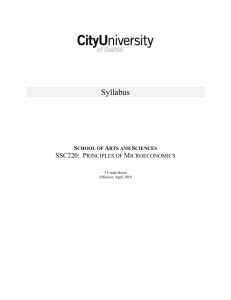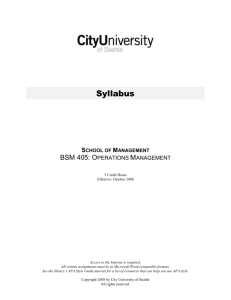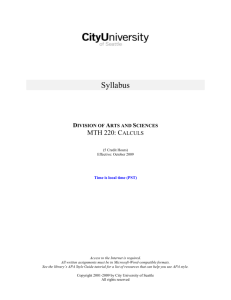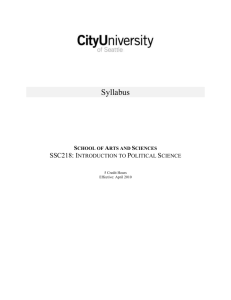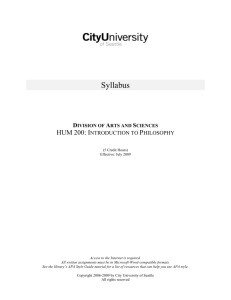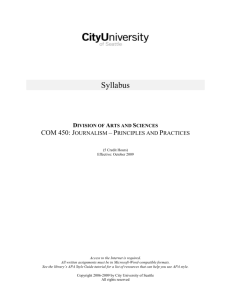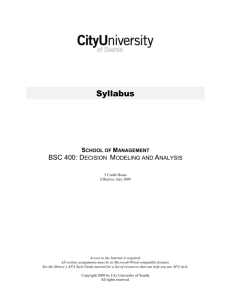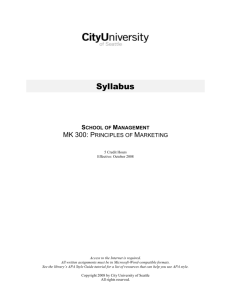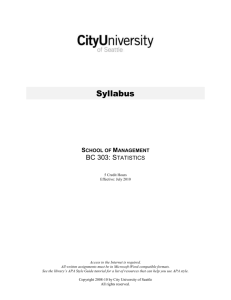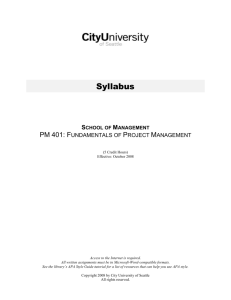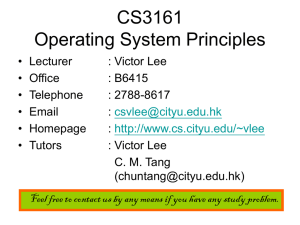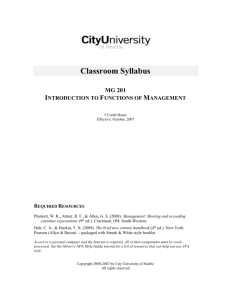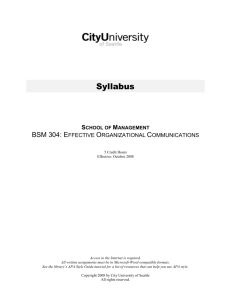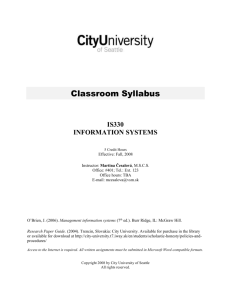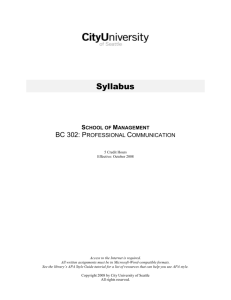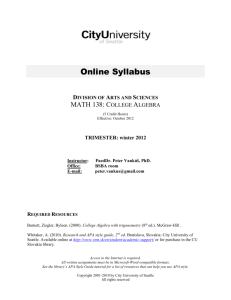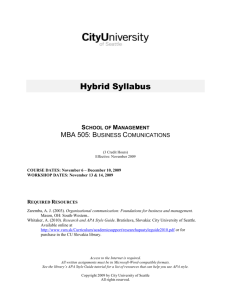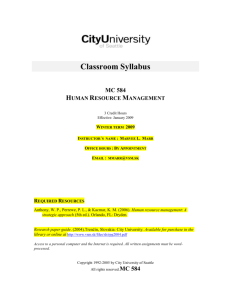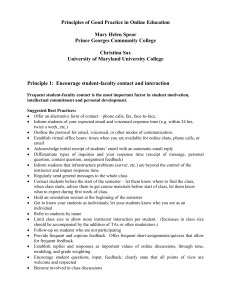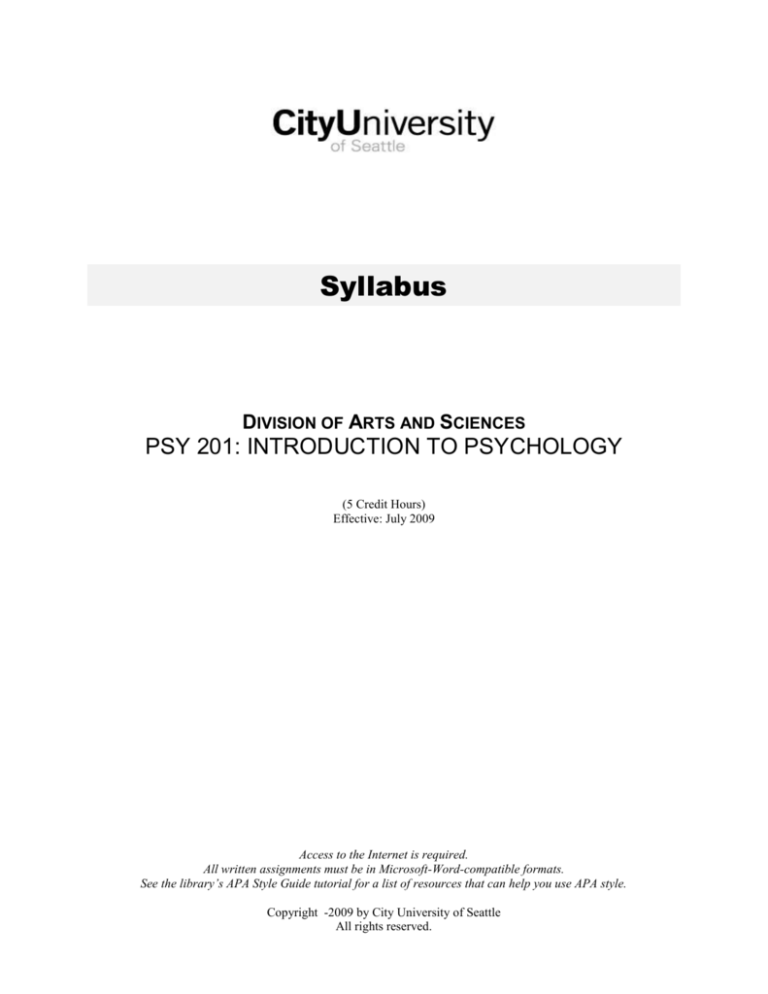
Syllabus
DIVISION OF ARTS AND SCIENCES
PSY 201: INTRODUCTION TO PSYCHOLOGY
(5 Credit Hours)
Effective: July 2009
Access to the Internet is required.
All written assignments must be in Microsoft-Word-compatible formats.
See the library’s APA Style Guide tutorial for a list of resources that can help you use APA style.
Copyright -2009 by City University of Seattle
All rights reserved.
PSY 201: INTRODUCTION TO PSYCHOLOGY
FACULTY
Faculty Name:
Contact Information:
[Instructor may insert personal message if desired]
COURSE DESCRIPTION
This course examines the field of psychology from a variety of theoretical perspectives. Topics include:
the physiological basis of mental functioning; the physical, cognitive and social aspects of lifespan
development; learning, memory, and cognition; psychological disorders; emotions and health; thinking
and language; intelligence and motivation; perception and sensation; and the various theories of
personality.
This course is the prerequisite to the Bachelor of Arts in Applied Psychology program. It can also be
used as an elective for any other City University of Seattle undergraduate degree program.
COURSE RESOURCES
Required and recommended resources to complete coursework and assignments are listed on the
My.CityU portal at Library>Resources by Course.
CITYU LEARNING GOALS
This course supports the following City University learning goals:
City University of Seattle graduates exhibit professional competency and a sense of professional
identity.
City University of Seattle graduates are critical thinkers.
PROGRAM CONTEXT
This is a prerequisite course to core courses in Bachelor of Arts in Applied Psychology degree program.
This course can also be used to fulfill social sciences requirement of your degree.
COURSE OUTCOMES
In this course, learners will:
1. Critically apply an understanding of major psychological theories and concepts to human behavior;
2. Apply psychological theories and concepts into understanding of personality;
PSY201
Page 2
Eff: 07/09
3. Apply contemporary understanding of motivation, intelligence, and thought to learning and cognition.
CORE CONCEPTS, KNOWLEDGE, AND SKILLS
To achieve the goals of this course, you will need to master the following core concepts:
1. Theoretical perspectives in psychology;
2. Biosocial and psychosocial aspects of lifespan development;
3. Learning, memory, and information processing;
4. States of consciousness;
5. Selected psychological disorders and their treatment;
6. Theories of personality;
7. Emotions, stress, and health;
8. Sensation and perception;
9. Behavior.
OVERVIEW OF COURSE GRADING
The grade you receive for the course will be derived using City University of Seattle’s decimal grading
system, based on the following:
Course Activities
Quizzes (equally weighted)
Problem Papers (two equally weighted)
Reflection Paper
TOTAL
25%
30%
20%
25%
100%
SPECIFICS OF COURSE ASSIGNMENTS
Your instructor will provide grading rubrics that will provide more detail as to how this assignment will
be graded.
Discussion Activities
Class participation through discussion is an integral part of this online course, although it is typically less
formal than other work submitted throughout the course. Participation is defined as active engagement in
a discussion or other online activity.
To provide a structure for balanced participation and allow you to maximize the benefit of the discussion
boards, it is recommended that you follow these guidelines:
PSY201
Page 3
Eff: 07/09
1) Post your responses to discussion questions in the first three days of the school week (Monday
through Wednesday).
2) Post three or more thoughtful and topic-relevant comments to responses made by classmates
during the last four days of the school week (Thursday through Sunday).
3) Respond to any questions that your instructor or peers have regarding your original post by the
end of the school week.
Grading Criteria for Each Discussion Activity
Meets requirements of the activity in a timely manner
25%
Adds insightful or new ideas, comments, or questions relevant to the
activity and/or to other students’ posts
Appropriately references readings, material in course sessions and other
postings
Writes clearly, concisely, and grammatically
25%
TOTAL
100%
25%
25%
Quizzes (equally weighted)
There will be three equally weighted quizzes in the course to reinforce the course materials. The quizzes
will test your ability to utilize psychological terminology as well as the identification and application of
proper psychological concepts for a given problem. All quizzes are closed book and notes. All quizzes
are created online; therefore each problem would be either correct or incorrect.
Problem papers
Students are expected to complete two four- to five-page, double-spaced papers that describe how the
problem of their choice is related to concepts discussed in this class and listed below. Each paper has to
deal with a different concept. Finally, students are required to use as many class terms as possible in their
application papers. All terms and concepts have to be underlined.
1.
2.
3.
4.
Biology and behavior;
Sensation, perception, states of consciousness and information processing;
Language, motivation, and thinking;
Emotions, stress and personality;
5. Psychological disorders.
Grading Criteria for Problem Papers
Organization and coherence
Evidence and support
Analysis and use of course concepts
Style and mechanics
20%
30%
30%
20%
TOTAL
100%
PSY201
Page 4
Eff: 07/09
Integration and Application Paper
Students are expected to prepare a seven- to eight-page, double-spaced paper that describes how they
would apply concepts and two or more theoretical frameworks covered in this course to a real life issue
that they are interested in.
Grading Criteria for Integration and Application Paper
Organization and coherence
Evidence and support
Analysis and use of course concepts
Style and mechanics
20%
30%
30%
20%
TOTAL
100%
COURSE POLICIES
Late Assignments
Per Division of Arts and Sciences policy, undergraduate students are required to submit all assignments
by the due dates stated in the syllabus. A late assignment is one that is submitted after the due date and
time or after any extension has expired.
If circumstances prevent a student from meeting the due date, the student is obliged to contact the
instructor and request an extension at least 48 hours prior to the date the assignment is due. Emergency
situations will be considered on a case-by-case basis. Being busy, pressured with outside work, or having
competing academic commitments are not valid reasons to grant extensions.
A student who receives an extension in advance of the due date and abides by the agreement with the
instructor is not subject to late penalties.
Without prior arrangement with the instructor, students who submit assignments late will receive a 15
percent deduction in grade each day or part of the day that the assignment is late. For example, if the
assignment is submitted two days late, 30 percent of the grade will be deducted.
Coursework received after one week (seven days) will not be graded and will receive a zero grade.
Participation
Undergraduate online and mixed-mode classes are required to use the Blackboard Discussion Board
online. Participation through discussion to exchange knowledge, ideas, and thoughts is an integral,
mandatory part of this course. Participation on the Discussion Board – the virtual classroom – enhances
the student’s learning process and experience in this course, and lack of participation will result in a
reduction in grade (see grading rubric).
Participation is active engagement in discussions in the form of sharing new ideas, examples and
resources, as well as constructive disagreement and incorporation of course materials and concepts in
comments. This requires frequent monitoring of the Discussion Board, timely responses, integration of
PSY201
Page 5
Eff: 07/09
course material and other sources, and ongoing conversations that extend, modify, and add to
understanding, creating a vibrant learning community.
The following guidelines apply to all DAS undergraduate online and mixed-mode classes:
1. For fully online courses, students are expected to spend one hour per credit hour per week
participating in online activities (for example, for a 5-credit course, the student would spend 5
hours per week on the Discussion Board). It is expected that students access their Blackboard
course shell, including the Discussion Board, a minimum of 3 days per week.
For mixed-mode courses, students are expected to spend the allotted online hours participating in
online activities (for example, for a 5-credit mixed-mode course where 3 hours are spent face-toface in a classroom, students would spend 2 hours per week on the Discussion Board).
2. The instructor will provide 2 or more discussion board questions/assignments by early Monday
each week (normally 2 or 3 per week for fully online classes, and one or more for mixed-mode
classes). Students must post their initial comments to each discussion board question/assignment
no later than midnight Wednesday.
3. For each discussion question/assignment, a minimum of 3 thoughtful and topic-relevant responses
to classmates’ comments are required no later than midnight Sunday. Explain why you agree or
disagree, ask questions, add to or modify ideas, and respectfully find strengths and weaknesses in
classmates’ ideas.
4. In order to encourage discussion, it is expected that students will participate throughout the week
rather than waiting until Sunday to post all responses.
5. Each post should be at least one well-developed paragraph (no less than 10 sentences in length).
“Good post” or similar responses are not considered contributions to class discussions and will
not count toward posting requirements.
6. In addition to making at least 3 responses to classmates’ comments per discussion
question/assignment, students must respond to all questions posed to their initial discussion
comments.
7. All posts must have correct grammar, spelling, punctuation, and APA style.
8. Students are expected to act professionally and respectfully, avoiding personal attacks. Instructors
have the right to remove inappropriate posts, and students will be held accountable to City
University guidelines for student conduct.
Professional Writing
Assignments require error-free writing that uses standard English conventions and logical flow of
organization to address topics clearly, completely, and concisely. CityU requires the use of APA style.
UNIVERSITY POLICIES
You are responsible for understanding and adhering to all of City University of Seattle’s academic
policies. The most current versions of these policies can be found in the University Catalog that is linked
from the CityU Web site.
Scholastic Honesty
Scholastic honesty in students requires the pursuit of scholarly activity that is free from fraud, deception
and unauthorized collaboration with other individuals. You are responsible for understanding CityU’s
policy on scholastic honesty and adhering to its standards in meeting all course requirements. A complete
copy of this policy can be found in the University Catalog in the section titled Scholastic Honesty under
Student Rights & Responsibilities.
PSY201
Page 6
Eff: 07/09
Attendance
Students taking courses in any format at the University are expected to be diligent in their studies and to
attend class regularly.
Regular class attendance is important in achieving learning outcomes in the course and may be a valid
consideration in determining the final grade. For classes where a physical presence is required, a student
has attended if s/he is present at any time during the class session. For online classes, a student has
attended if s/he has posted or submitted an assignment. A complete copy of this policy can be found in
the University Catalog in the section titled Attendance Policy for Mixed Mode, Online and
Correspondence Courses.
SUPPORT SERVICES
Disability Resources
If you are a student with a disability and you require an accommodation, please contact the Disability
Resource Office as soon as possible. For additional information, please see the section in the University
Catalog titled Students with Special Needs under Student Rights & Responsibilities.
Library Services
In order to help you succeed in this course, you have access to library services and resources 24 hours a
day, seven days a week. CityU librarians can help you formulate search strategies and locate materials
that are relevant to your coursework. For help, contact a CityU librarian through the Ask a Librarian
service. To find library resources, click on the Library link in the My.CityU portal.
Smarthinking
As a CityU student, you have access to 10 free hours of online tutoring offered through Smarthinking,
including writing support, from certified tutors 24 hours a day, seven days a week. Contact CityU’s
Student Support Center at info@cityu.edu to request your user name and password.
PSY201
Page 7
Eff: 07/09

